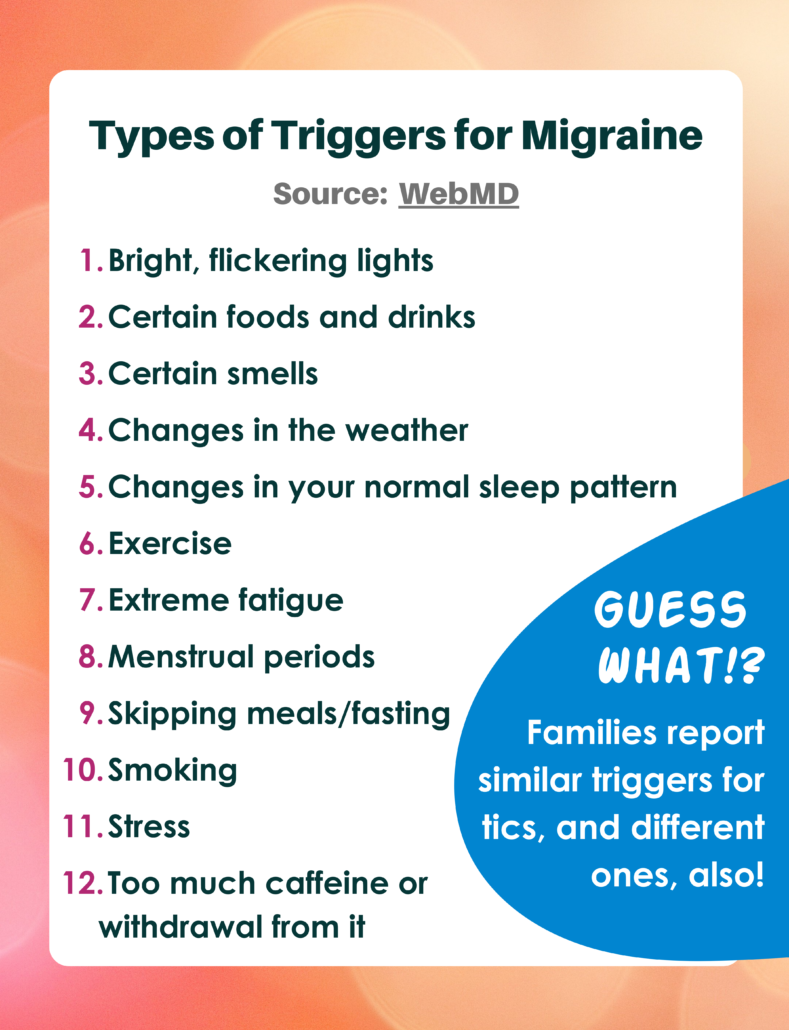The Tic-Trigger Approach That Can Make or Break Your Efforts
If you’ve read either of our two books, Natural Treatments for Tics and Tourette’s: A Patient and Family Guide and Tourette Syndrome: Stop Your Tics by Learning What Triggers Them, you’ve been introduced to the concept of triggers for tics. You would know that triggers are something that can aggravate or “set off” symptoms or behaviors in many medical conditions. In this case, tics. And you also know that there are steps you can take in an effort to identify them.
Finding triggers for tics can be wonderfully life-changing. The search can be challenging, but if you don’t make the effort, you’ll never know the benefit of finding triggers. In this article, you will learn about a critical step to success in the trigger search that many people fail to take.
Taking a cue from migraine triggers
Patients and parents often have trouble grasping the potential role of tic triggers. Why? Doctors don’t talk about triggers for tics beyond stress and fatigue. Mainstream advocacy organizations downplay and ignore the topic. And research doesn’t focus on it. As a result, families are left to explore tic triggers on their own.
You’ve probably been told that Tourette syndrome is genetic and there’s nothing you can do, or that tics might simply go away on their own so just “wait and see.” Or, you might have been offered drugs as the first line of treatment. Without support from the media, physicians, or the general tic community, the entire concept of triggers for tics can seem confusing.
Looking for triggers–environmental causes for tics–requires you to think outside the box.
If someone is prone to migraines, he or she often wants to know what might have triggered the symptoms. Who wouldn’t want to avoid future pain if possible? Think of tics in the same way. What might be aggravating the nervous system resulting in tics–and can this be avoided?
WebMD lists these common triggers for migraine headaches:

How did the list of migraine triggers develop? Patients reported their experiences and their responses were compiled. More than one hundred studies have looked at migraine triggers. This is in stark contrast to the lack of studies on triggers for tics, and the fact that patient or parental reports on tic triggers are generally ignored or disbelieved by the medical community.
When you’re looking for tic triggers, don’t skip this key approach!
The first step in successfully identifying your triggers is to track symptoms in a diary. You have to make a note of what you as a patient (or your loved one) were doing before tics started or worsened–and keep tracking over time. If you fail to do this, a clear pattern may be difficult to recognize.
Of course, sometimes you may get lucky and an obvious trigger pops up, but that’s not usually the case. Frequently there is more than one trigger, and they can overlap and be difficult to tease out. You have to be a careful investigator (while meanwhile, you juggle all your other day-to-day duties)! No, it’s not always easy. But logging symptoms and exposures can bring rich results. Jot things down and review them later when you have time.
If you have not done so, we suggest you read our user-friendly book Stop Your Tics by Learning What Triggers Them. It will open your eyes to potential environmental factors, including diet, that could be affecting tics and take you step-by-step through the process of finding them.
Please take advantage of the free diaries, logs, and charts we offer online to help you and your children with your efforts.
The resources were designed as a companion for Stop Your Tics by Learning What Triggers Them. We are making them available for all of our readers as a free feature.
We suggest you review the information given on our Trigger Resources page to select the printable charts that you consider most helpful to your situation. Then use them!
Download your resources–click here
Feel free to ask questions and share your experiences with a comment (you have to scroll down to find the comment section).










Wish we’d known about triggers when my son first had tics. They hurt his self esteem before we found out some foods and chemicals were setting him off. Important article.
Jeannine, thanks for the comment. I was in the same boat when looking for help for my son. An integrative doctor turned us on to triggers and it was an immense help. That, plus special allergy treatment. I hope your son is doing really well. Mine is, gratefully. We keep trying to get the message out!
Thanks for these. Ive had your daily log for tic triggers for several months. I see the difference when I track and when I don’t. I’ll try a couple of the others with my daughter. :)
I’m so glad the Daily Log helps, MamaBear. And it’s such a good idea to get kids involved once they are aware of their tics. That can be empowering to them. Let us know how you make out. We’re always open to suggestions!
Sometimes it seems overwhelming, there are so many possible issues–from pesticides to milk. I’m going to give it a try by picking a few to focus on. We do see tics wax and wane. I’d love to know what is behind that.
Good luck, Peter. That’s a good idea, to start with a few and monitor. When it comes to food, it is often suggested to start with favorite foods first.
This is such common sense. Why don’t doctors don’t know about it. We started looking at food first, and then saw how scented and smelly things (like gasoline) also were trouble.